
Transcription
H A R L A N R I C H A R D S
May 12, 2014
How I Got Life In Prison
In previous blogs, I have spoken about how I was attacked without provocation and killed my attacker in self-defense. I would not like to tell how my own poor judgment and bad decisions turned that act of self-defense into a first degree murder conviction.
After I fled from the fight, I was so scared I just kept driving. By morning, I was down in southern Illinois. I was still scared and didn't know what to do. I had no intention of going to the police. In my life, the police were always the bag guys. They couldn't be trusted. After a while I calmed down and took the time to think things through. I had done nothing wrong. I was the victim - attacked by a raging maniac for no apparent reason. I hoped the guy was not too badly hurt. I didn't think he could have died from the wounds. He was up and walking and hollering when I last saw him.
I was still with my cousin and we turned back toward Madison. I stopped to call the only attorney I knew - Bruce Rosen. I trusted him completely. He defended me in 1973 when I shot my brother and again in the 1980s when I was facing drug charges. When I had no hope and didn't care what happened to me after my brother's death, Rosen defended me at a murder trial and saved me from a long prison term. Trusting Rosen in 1984 was my undoing but I had no way of knowing it at the time.
I met with Rosen while my cousin Lyle met with his attorney, Dan Linehan. I told Rosen exactly what happened. I assume Lyle did the same with his attorney. Rosen said as far as he was concerned it was a "who dun it" until the police came up with evidence of me stabbing Dick. I turned myself in to the Dane County's Sheriff's Office with Rosen at my side. I was afraid that they would shoot me on sight if I came in alone without any witnesses. Rosen told me not to answer any questions and to conceal my injuries so I refused to answer the booking questions. They placed me in isolation for refusing to speak. I expected to see Rosen right after booking but they wouldn't let me see him until I answered their questions. After several hours, I finally answered their questions so I could see my attorney.
Dick bled to death as a result of the stab wounds. I was charged with first degree murder. I couldn't believe this was happening to me. It was my worst nightmare.
Harlan Richards/page two/May 12, 2014
After 5 days, I was released on $35,000 property bond put up by my parents. It is amazing how many sleazy, lying scumbags there are in a county jail. After only 5 days, where I said nothing to anyone about what happened, two jailhouse snitches came forward with fabricated stories about statements I allegedly made to them about the stabbing.
Rosen hired an ex-police detective named Charles Lulling. He was the Madison detective who handled the 1973 shooting go my brother. Now he was on my side. Or so I thought. Rosen asked me if I objected to him. I had nothing against him. Little did I realize how Lulling felt. He was still smarting about me avoiding a murder conviction in 1973 and set out to make up for it in 1984. It was another fateful error on my part. Lulling was the one who first proposed the contrived defense to Rosen.
Lulling went out to the apartment to look around and noticed a pool of blood on the sidewalk outside. He wanted to know what it was from. I had no idea. It wasn't there when I left. Rosen was still intent on the "who dun it" theory of defense. Under discovery, we eventually got all the statements made to the police. Lyle and I had both refused to give statements based on the advice of our attorneys. Shirley told exactly what happened and Ron made up a story about me shoving Dick to start the fight. Ron then went on to claim that he ran down the hallway when Dick hollered for help, saw me straddling Dick on the floor and kicked me to dislodge me from Dick. Ron next claimed he went to the kitchen got a knife and ordered me out of the apartment.
The police were rightly confused. Had Lyle and I gave them statements about what happened - rather than take the advice of our attorneys - I probably would never have been charged with murder. Instead, the police staged a "reenactment" with Ron and Shirley which caused Shirley to change her statement to match Ron's lies. Shirley was empathetic in her police statements: Ron never went down the hallway past her. At the trial, Shirley testified that as she turned her head she felt this whooping and that must have been when Ron went past her down the hallway. It was a stroke of genius on the prosecutor's part and just enough corroboration for Ron's lies to be believed by the jury. Instead of Ron being exposed for his cowardice, he came out looking like a hero. Ron had to lie; he had recently been paroled after serving time for attempted murder. Had he told the truth, his parole would have been revoked.
Harlan Richards/page three/May 12, 2014
Meanwhile, Lulling and Rosen were busy cooking up a defense based on the "who dun it" theory. They decided to use the pool of blood outside of the apartment to claim that Lyle stabbed Dick outside of the apartment. They wanted me to testify that I ran outside with Dick chasing me where Lyle attacked him and inflicted the fatal wounds. There was a missing kitchen knife and the pool of blood to support their theory of defense. Lulling was the one who thought up the story and pushed it on Rosen. Rosen trusted Lulling's judgment and wanted to present it as a defense. I objected. I did nothing wrong and wanted my day in court to vindicate myself.
Rosen gave me several good reasons for going along with the story. Most important was that he said my prior manslaughter conviction would be brought into the trial if I relied on self-defense. If that happened, I could expect the jury to convict me regardless of the evidence because I was a two-time killer. They also told me about a trial where Rosen had recently gotten his client an acquittal based on a similar deception. The defendant had testified that he had thrown the knife he was carrying into a lagoon/ After the pathologist testified about the the nature of the words, Lulling came in at the last minute with a knife he claimed to have pulled out of the lagoon where the defendant threw it. The words described by the pathologist could not have been caused by the knife Lulling recovered which resulted in an acquittal. Implicit in this description was the fact that Lulling waited until the pathologist described the wounds so he could come forward with a knife that did not match the wounds in order to secure an acquittal for their client.
My parents paid Rosen $20,000 to represent me. It as their entire life savings. Rosen told me it was the only defense he would present for me and that if I didn't go along with it I could go to another attorney and he would keep the retainer. I felt I had no choice. He was the only thing standing between me and my worst nightmare. I wouldn't dream of going to trial with anyone else. Rosen had an almost mythic quality about him in my eyes. I believed I would get justice and be vindicated with Rosen at my side. I didn't really care what method he used. If he wanted to mislead the jury to get me the acquittal I deserved, then I would help him all I could.
First, Rosen wanted me to get Lyle out of town for the trial. Lyle had not cooperated with Rosen during his preparation for the trial. It was inexplicable. Lyle should have been eager to help me. But Lyle didn't trust Rosen and wouldn't give Rosen any of the information Rosen needed on the background
Harlan Richards/page four/May 12, 2014
of Shirley. Rosen wanted Lyle to disappear, so that's what I did. Next, Rosen hired a blood expert to testify that the pool of blood could only have been caused by someone standing there and bleeding outside of the apartment. Finally, he wanted me to recruit a credible witness to testify that Lyle and I met with that person after the stabbing and that Lyle admitted stabbing Dick outside of the apartment. That way, it didn't matter what lies Ron told because our story would be so different from his that the jury would have a reasonable doubt. I would be acquitted - for the wrong reasons, but acquitted.
The stabbing happened in April and the trial was scheduled for the end of October. I did what Rosen asked found a witness and made sure Lyle would not appear at the trial/ It was a tense six months.
The Endres family came from the west side of Madison, not far from where I grew up. Even though I did not recognise them on the night of the stabbing, when I heard their names afterward I knew who they were based on their reputations. They wee renowned for their violence and dangerousness. There were very few people who grew up on the west side of Madison who did not know and fear the Endres family. Dick was the worst of the lot. He was the one to whom the other Endres brothers went when they needed help. That night in April was no different - except for the outcome.
Ron wanted to get back at me but was afraid to come after me himself. He lived 3 blocks from my parent's house where I was staying while I was out on bond. He sought other ways to get at me. He had heard that I was dating a woman who worked at a bar located in Monona called "Off the Wagon." He didn't know who it was, only that it was a dark-haired woman who worked there. Meanwhile, my girlfriend quit bartending there and another dark-haired woman was hired.
Ron had a friend, a fellow Viet Nam vet named Steve Garrard who was a sexual predator. He had served time for rape in the past and there was no sexual predator law to keep him in after he served his time. He was living in Ron's basement. Ron took Steve to Off the Wagon and struck up a conversation with the bartender. He persuaded her to accompany him and Steve to a party after the bar closed. On the way to the party, Ron stopped at an apartment, ostensibly to pick something up. But he came back to the car and told them he was staying and to go ahead to the party without him. There was no party; it was a ruse to get the woman alone with Steve.
Harlan Richards/page five/May 12, 2014
Steve took the woman to Ron's house and persuaded her to stop in for a moment before they went to the nonexistent party. Once he had her there, he brutally raped and tortured her for hours. She broke free at one point and ran for help. But he caught her and dragged her back in. She finally convinced him that she would go to the veteran's hospital with him to get him help. His time in Viet Nam had twisted him up inside and made him into a predator.
As soon as she was free of him, she called the police. The police caught Ron and Steve together in Ron's car after Steve picked him up to drive him home. At first, Ron was implicated. But Ron was the star witness in my murder trial. Without him, there was no evidence of murder. Ron's part in the abduction and brutal rape was hushed up. Ron's car, Ron's house, Ron getting the two of them together under false pretences was all kept quiet. A couple of days after this, the prosecutor filed a motion for a speedy trial. She had to get the trial over before Ron did something else. I received word through a friend that Ron was behind the rape and that he thought it was my girlfriend. An innocent woman was brutalised in an attempt to sate Ron's thirst for vengeance.
I was in prison with Garrard and spoke to him about what happened. I asked him to come forward with the truth several times. He was serving a 50-year sentence and could possibly have reduced his sentence had he come forward to tell why he attacked that woman. But he was loyal to the end. His story was that Ron told him that the woman was a freak who liked rough sex and that it was okay to do what he did to her. Ron played up their common experience in Viet Nam to form the bond needed to persuade Garrard that what he wanted to do was okay. Garrard died in prison of cancer. Perhaps it was a just end for him.
What would I have done if he had gotten my girlfriend? I don't know.
There were other incidents during that summer where different members of the Endres family tried to get at me or get my bail revoked. None of it was successful. I was self-employed as a vendor at county fairs and other special shows. I spent most of my time traveling from fairgrounds to fairgrounds selling my goods and making the most of my freedom. I was in denial. I didn't want to face the trial or the chance that I might go to prison for life. I wanted it to all go away. It didn't matter what I wanted. The trial arrived.
Harlan Richards/page six/May 12, 2014
The jury was chosen and the prosecutor put on her witnesses. Ron lied as expected, Shirley changed her story to match Ron's story as expected. Shirley's two children, too young to really know what they were saying, came up with some outlandish stories. In their statements to the police, they saw nothing. After their reenactment (which they did not attend) they both had a lot to say on the matter. Rosen did very little cross-examining of the witnesses. He didn't bother to impeach them to the extent he could have. He exposed the reenactment and Shirley's change of testimony but left Ron's past and his motive to lie unrevealed to the jury. Rosen kept telling me it didn't matter. It all depended on the pool of blood outside of the apartment. As long as the prosecutor did not bring in testimony in her case in chief about the origin of the pool of blood, the contrived story would work. Any testimony of rebuttal would look like a fabrication by the state.
Well, sure enough, the last witness to testify was a paramedic who explained that the pool of blood was caused when Dick was shifted from one stretcher to another and the excess blood was dumped off the original stretcher. There went Rosen's fabricated story. Now what?
We met that evening in Rosen's office to discuss the next step. Rosen asked me what I wanted to do. I told him I wanted to do what I had always wanted to do - tell the truth and assert self-defense. Rosen wanted to know where Lyle was and I didn't know. I followed his order and told Lyle to disappear for the trial. I asked Rosen to seek a continuance or a mistrial so we could get Lyle to the trial. Rosen refused, saying he would have to tell the judge what he had planned and he was not going to do that.
As I look back on it now, I believe Lulling was the one who tipped off the prosecutor on the last day of presenting her evidence about the pool of blood. There was no other reason for the paramedic to testify. Lulling guided Rosen into setting up the contrived story and then destroyed the only piece of evidence supporting the story when it was too late to prepare a defense based on the truth. I think Rosen acted in good faith all that time. I have no proof, only suspicious and circumstantial evidence.
The rest of the trial was a travesty. I testified to the truth - which made very little difference to anyone. With Lyle gone, I had no credibility. All she had to do was ask the jury, "If Harlan's telling the truth, why isn't his cousin at the trial to testify?" She didn't stop at that, though. She engaged
Harlan Richards/page seven/May 12, 2014
in every bit of shady conduct she could possibly get past the judge. Even with all that, it still would not have been enough to persuade a jury beyond a reasonable doubt had not the judge jumped on the bandwagon.
He crafted jury instructions to ensure a conviction based on the evidence. The first thing he did was create an instruction which incorporated the shove alleged by Ron as a fact: "If you find the defendant provoked a fight by engaging in unlawful conduct in shoving Mr. Endres, he is not privileged to resort to the use of force intended or likely to cause death or great bodily harm to Mr. Endres unless he reasonably believes he has exhausted every other reasonable means to escape from or otherwise avoid death or great bodily harm at the hands of Mr. Endres." It made the shove an undisputed fact and left it to the jury to decide if it was unlawful conduct which took away my right of self-defense. Next, he told the jury to stop deliberations once they found guilt on first or second degree murder. Under the law, if they found facts to justify a murder conviction, they were then required to determine if there were mitigating factors which reduced the conviction to manslaughter. The jury was so confused over the instruction they asked that the testimony about how the fight started be read back to them. In the end I was found guilty of first degree murder.
The judge immediately sentenced me to life in prison. I was angry. I got tricked. I was angry at everybody but myself. As I look back on it all, I can now see that I put myself in prison. Every time I had a choice to make, I made the wrong one. Every time there was a crossroad which led to either prison or acquittal, I chose the path to prison.
In my next blog posting, I am going to explain how my flawed judgment caused me to lose all of my appeals. I will also explain why I am bringing this up 30 years later when it should no longer matter. Unfortunately, it has become as relevant now as when it first occurred - thanks to Scott Walker and his "lock 'em up and throw away the key" agenda.
Other posts by this author
|
2021 jun 25

|
2021 may 25
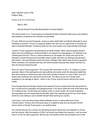
|
2021 apr 23

|
2021 feb 19
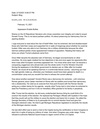
|
2021 feb 17
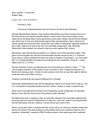
|
2021 feb 15
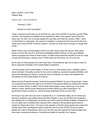
|
More... |
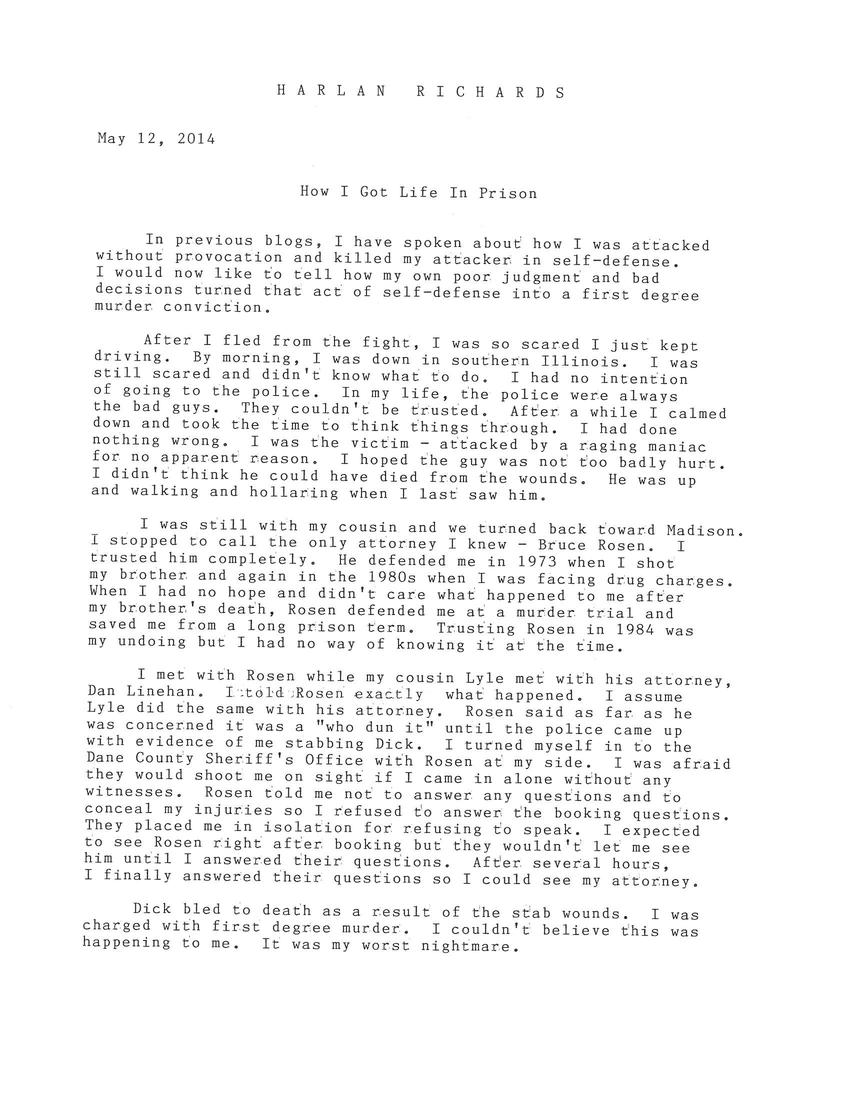
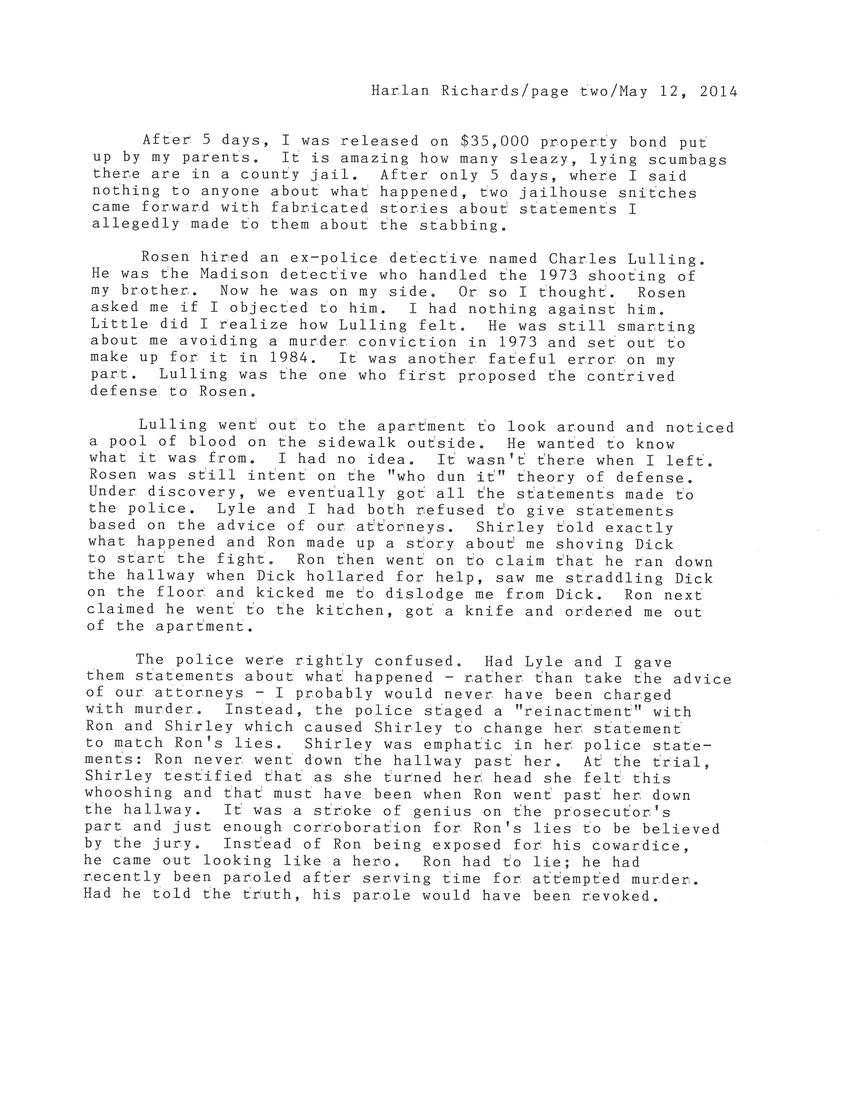
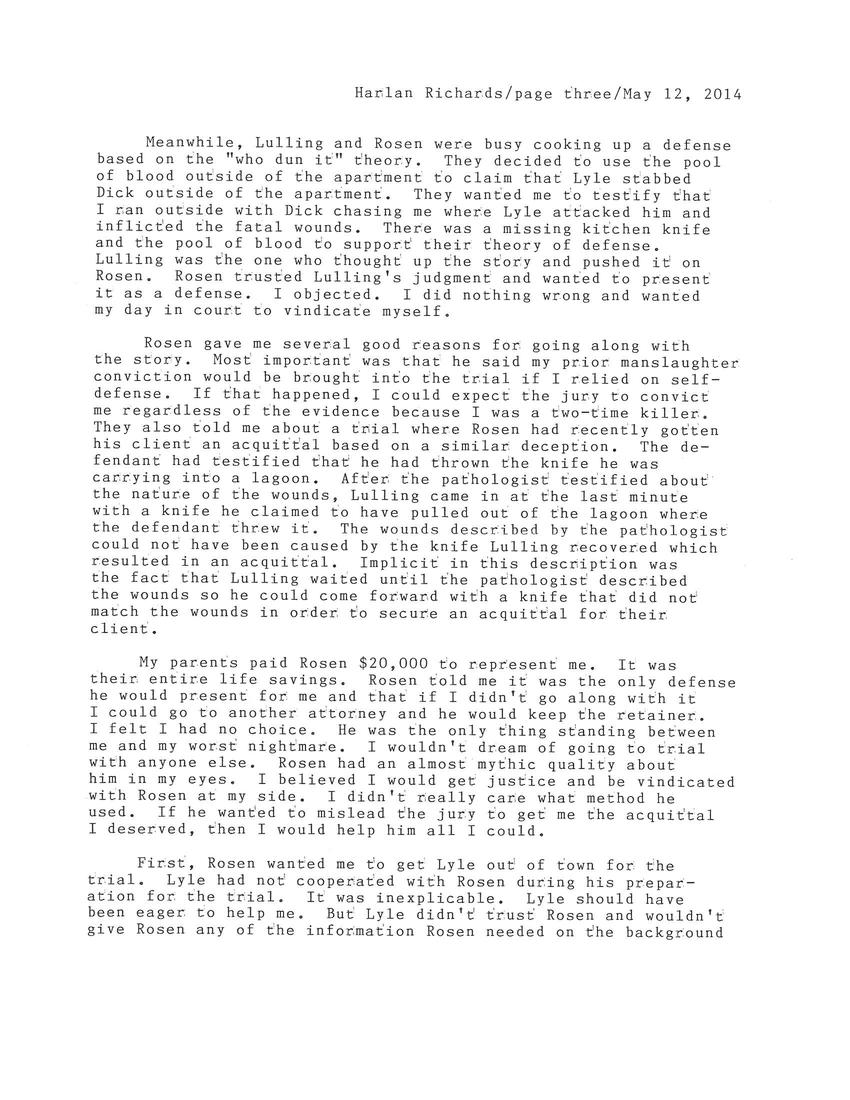
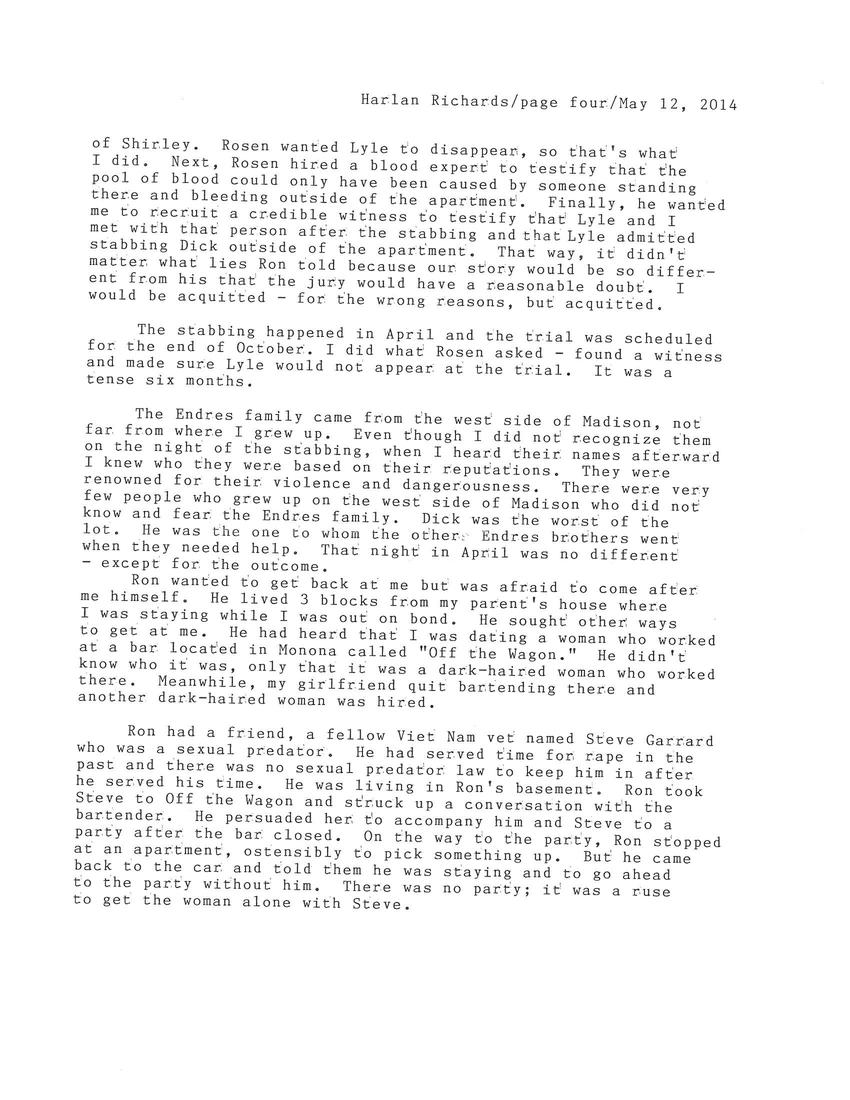
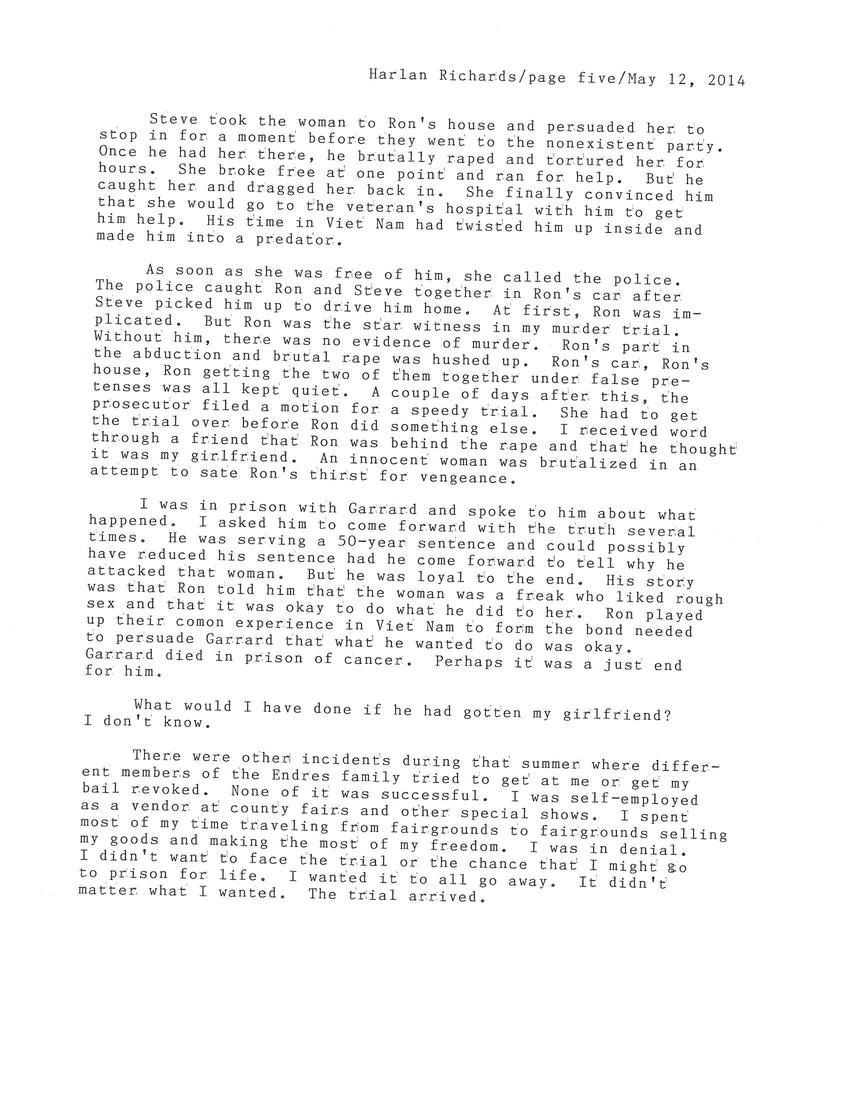
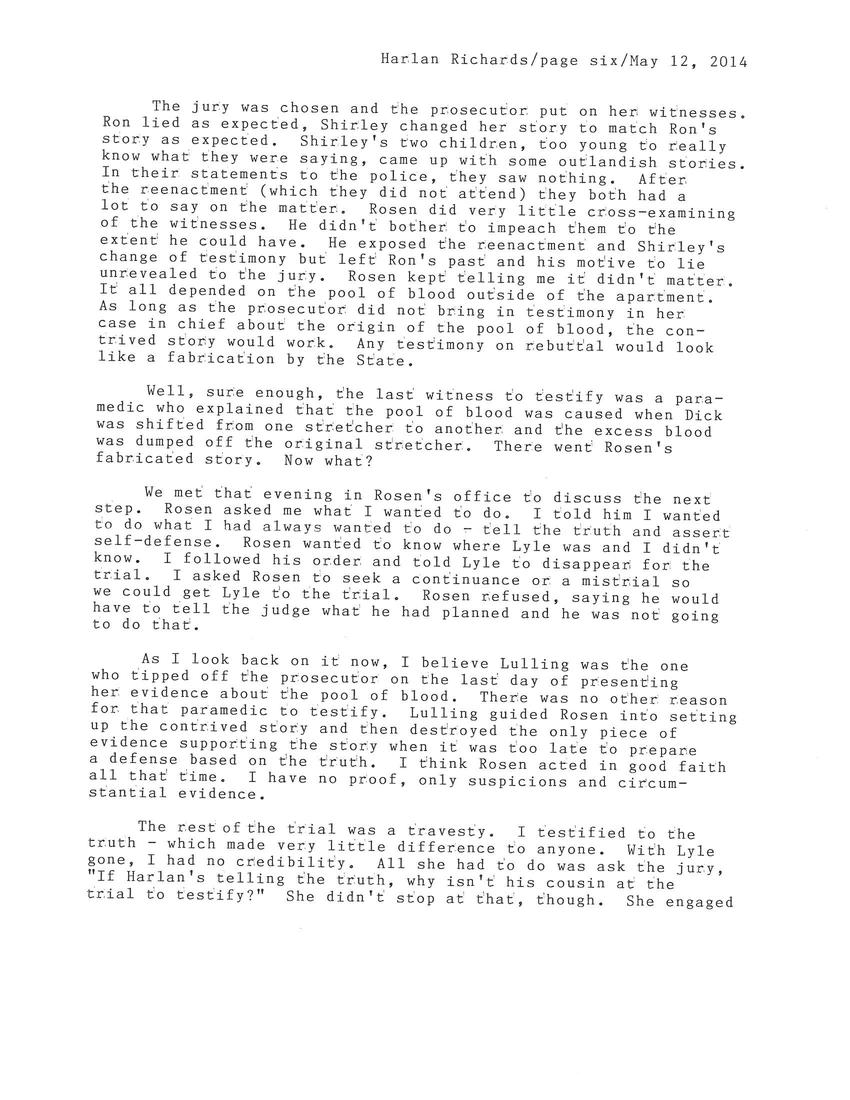

Replies